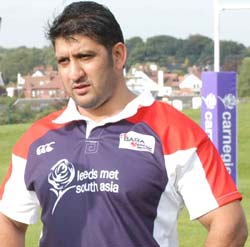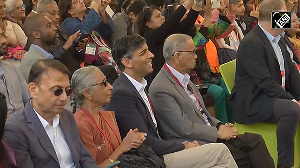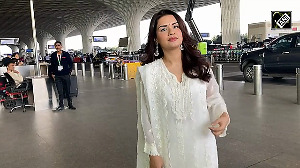For a change it was rugby weekend in Mumbai. On Saturday, the 72nd All India and South Asian Rugby tournament came to a climax under fading light in the presence of a couple of hundred spectators.
The British-Asian Rugby Association team, a hurl of red and blue, roared in celebration as full time was called. They had stamped their professionalism by beating Bangalore Rugby Football Club 27-3. The beer flowed generously as the group of expat South Asians gulped down their victory on debut in India.
 Ikram Butt, who had made his talismanic presence in the game, soaked it in silently. At 37, he has seen the ups and downs of the game, broken through a system laden with racism and prejudice, and is now happy playing a unique role in society in Bradford.
Ikram Butt, who had made his talismanic presence in the game, soaked it in silently. At 37, he has seen the ups and downs of the game, broken through a system laden with racism and prejudice, and is now happy playing a unique role in society in Bradford.
Butt was not the captain, but their leader in many ways. He has helped give the team and its members an identity.
An alumnus of the Leeds Metropolitan University, which sponsors BARA under the Carnegie banner, and the Community Sports and Activities Development Officer at Bradford Council, Butt founded BARA last year.
"A lot of guys here should've played at higher levels," he says, looking at his teammates. "But the opportunities were not there. That's what we are trying to do back home, open more doors for the youngsters. The atmosphere is still hostile; people are still reluctant to bring in Asians. BARA will provide them a platform."
For Butt, the essence of sports lies in its activism.
The struggles began since he picked up the rugby ball at the age of nine. Progressing through the ranks, laden with racism and prejudice, in 1995, Butt became the first player of Asian origin to represent England's rugby side.
He played for five English rugby clubs, but the fight still continues: to take rugby to the minority communities in the country and take minority communities to new avenues of success.
BARA is an institutionalized beginning in the direction. To spread its message, Butt has worked in under-privileged areas of Bradford, the city subjected to severe social tensions, by investing his own time and money.
A second generation Briton, whose parents came from Pakistan, Butt says being deemed British citizens has not been enough to show their affiliation.
"I turned professional at 17. There were no Asians playing then and I always had to give more than my hundred per cent, put in extra effort than the rest to reassure them. Overcoming discrimination was the biggest hurdle for me.
"Luckily, I came from a family keen of sports and they supported me a lot. My dad was a boxer and was very supportive of me to take up any sport. A lot of Asian parents are reluctant and discourage their children from playing professionally. But my brother, Khurshid, had also signed up for a club and I built on the start he gave me."
Ten years after he began as a professional, Butt was given the England berth in a European series, also featuring Wales and France.
"There were a lot of times before I played for England when I felt like I was hitting against a brick wall. I just had to pat myself on the back, take it as a challenge and set out to realize my dream.
"So playing for the national team was the biggest honour. I clearly remember the time I was in the England dressing room, being part of the best players in the country. It's alright training with the team, but when you wear the England jersey you grow ten inches taller."
The stocky winger played the full 90 minutes, but came down with flu after the game.
"I never had flu before that," he says with a smile, "Maybe, it was just the excitement of it all."
Butt played only one game for England but sent out a strong message of hope to aspiring Asian sportsmen. A few Asians have made it to the highest level in their respective sports, Nasser Hussain, the former cricket captain being a prime example, but there still aren't enough coming through.
That is the threshold Butt wants to break, especially in a sport like rugby, which is not conventionally popular among the minority communities.
"There are a lot of talented youngsters out there, boys and girls. But not enough are coming through, be it cricket, football or rugby."
"We try to address some of the issues with help of the NGO's. We have to get the youngsters aspired enough and need to make parents comfortable because they won't completely support the initiative if they don't see a bright future for their children."
In a world of commercialised sports, efforts like these go a long way in thrusting sport as an agent of social change.







 © 2025
© 2025